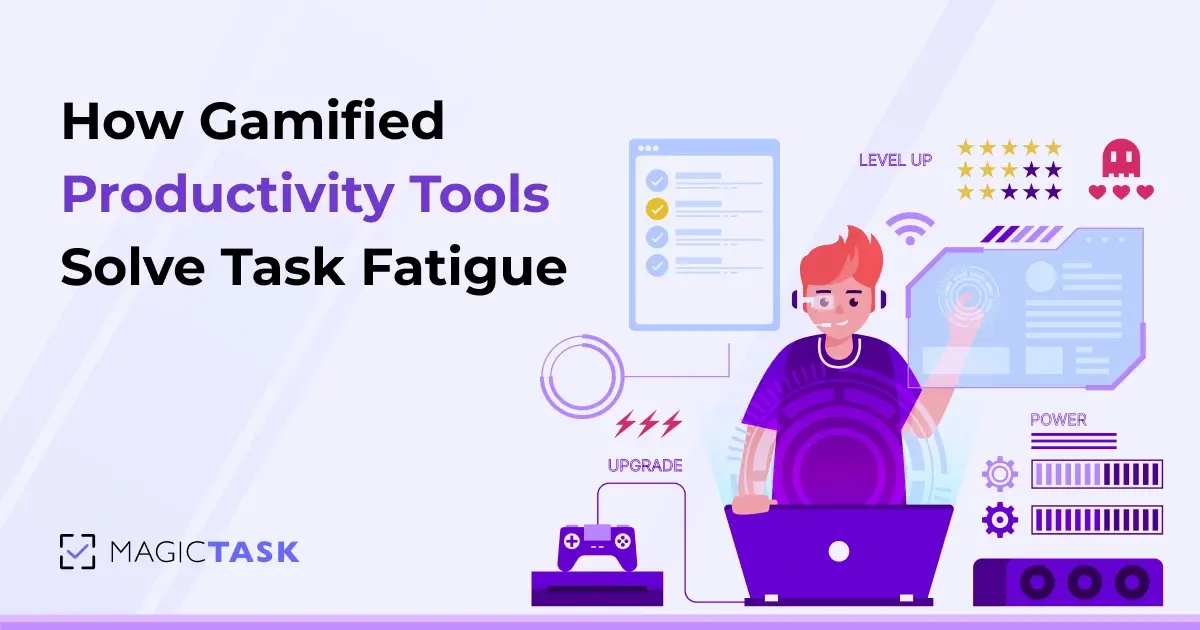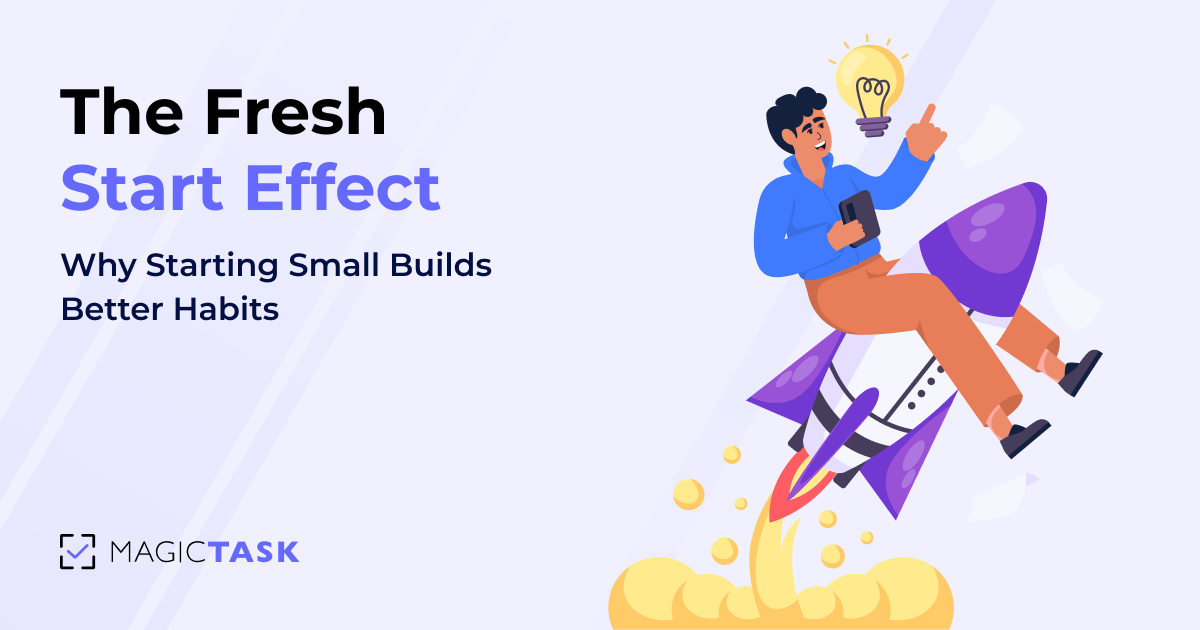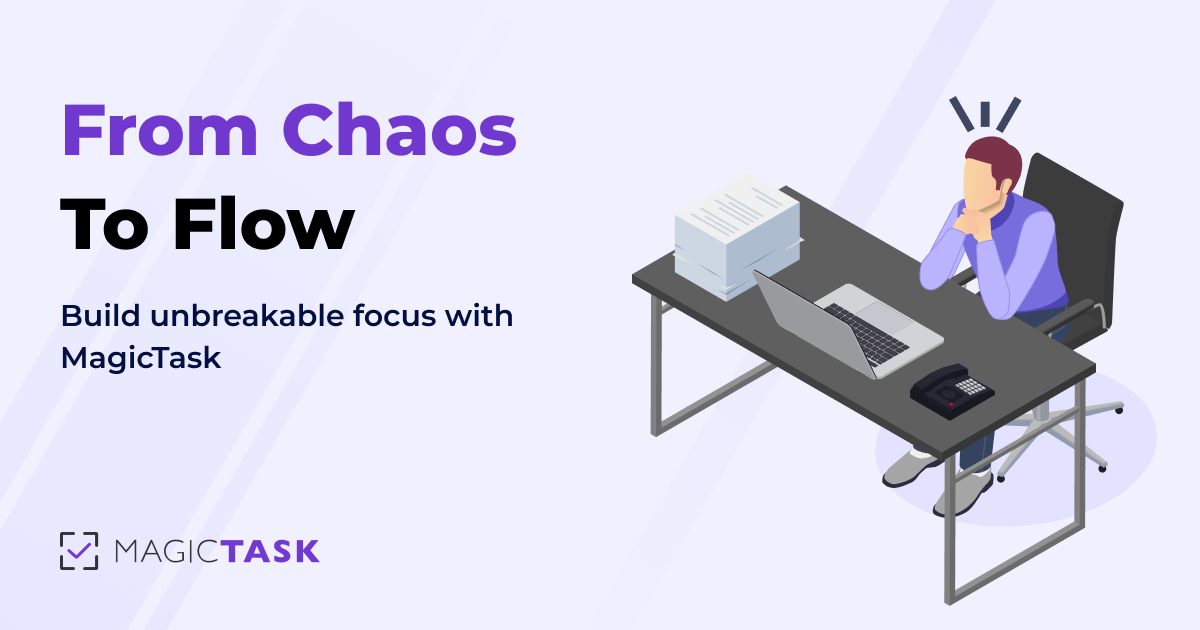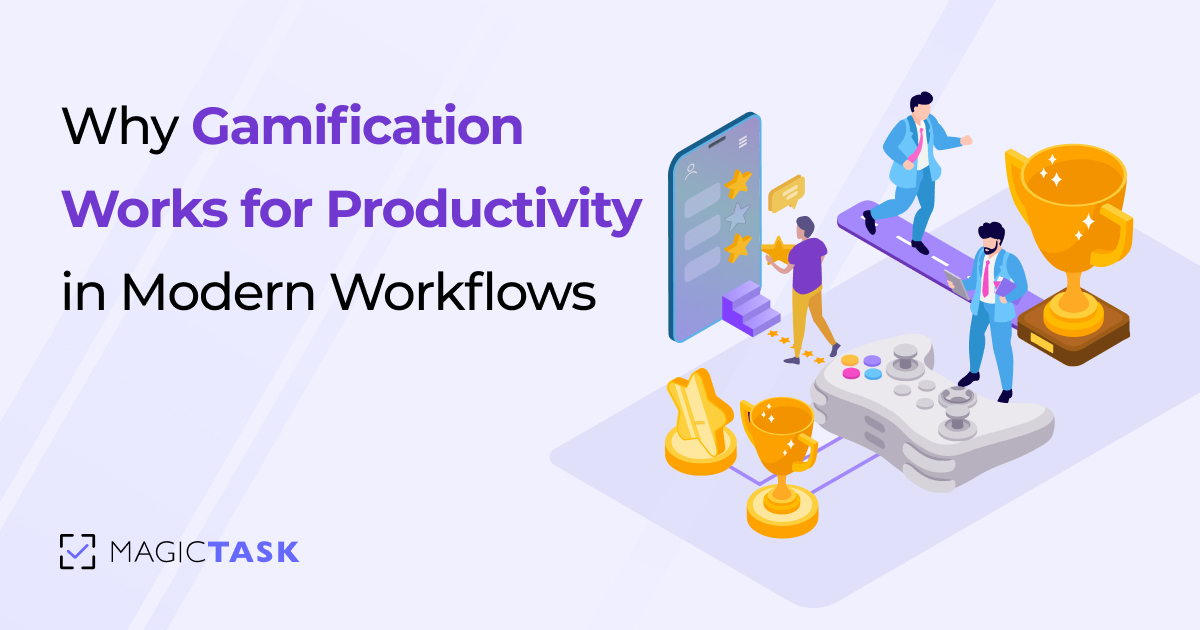Perfectionism Is Killing Your Productivity: Here’s How to Fix It
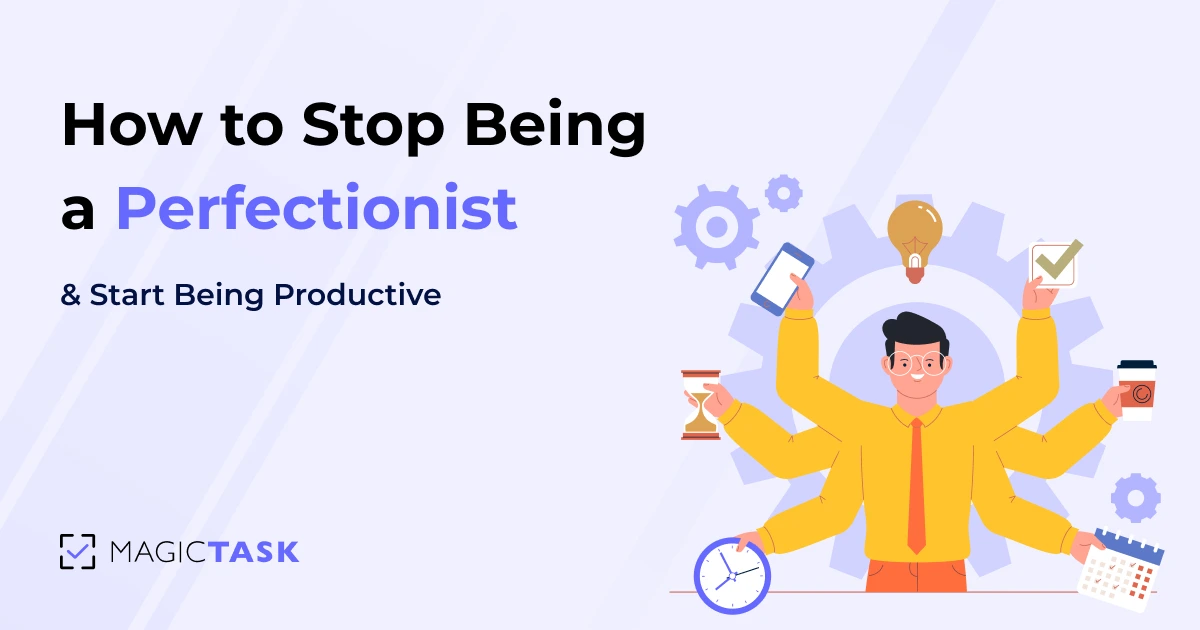
If you’ve ever spent hours rewriting an email draft, tweaking a presentation, or reorganising your task list instead of actually starting the work, you’re not alone. Perfectionism feels productive because you’re doing something, but beneath the surface, it quietly drains momentum.
High-performers often get stuck here. You want every project to be flawless, every detail to be airtight, and every outcome to exceed expectations.
The problem is that the pursuit of “perfect” traps you in an endless loop of overthinking, second-guessing, and unfinished work.
In this blog, you’ll learn why perfectionism stalls productivity, how to reframe your approach to getting things done, and how MagicTask makes consistent progress feel natural, maybe even addictive.
What’s Really Stopping You from Finishing Things?
Perfectionism often disguises itself as ambition, but at its core, it’s usually rooted in fear of failure, judgment, or losing control.
When you demand flawless outcomes, every task begins to feel heavier than it really is.
Instead of taking action, you start analysing every possible angle, drafting and redrafting, and holding off until the “right” moment arrives.
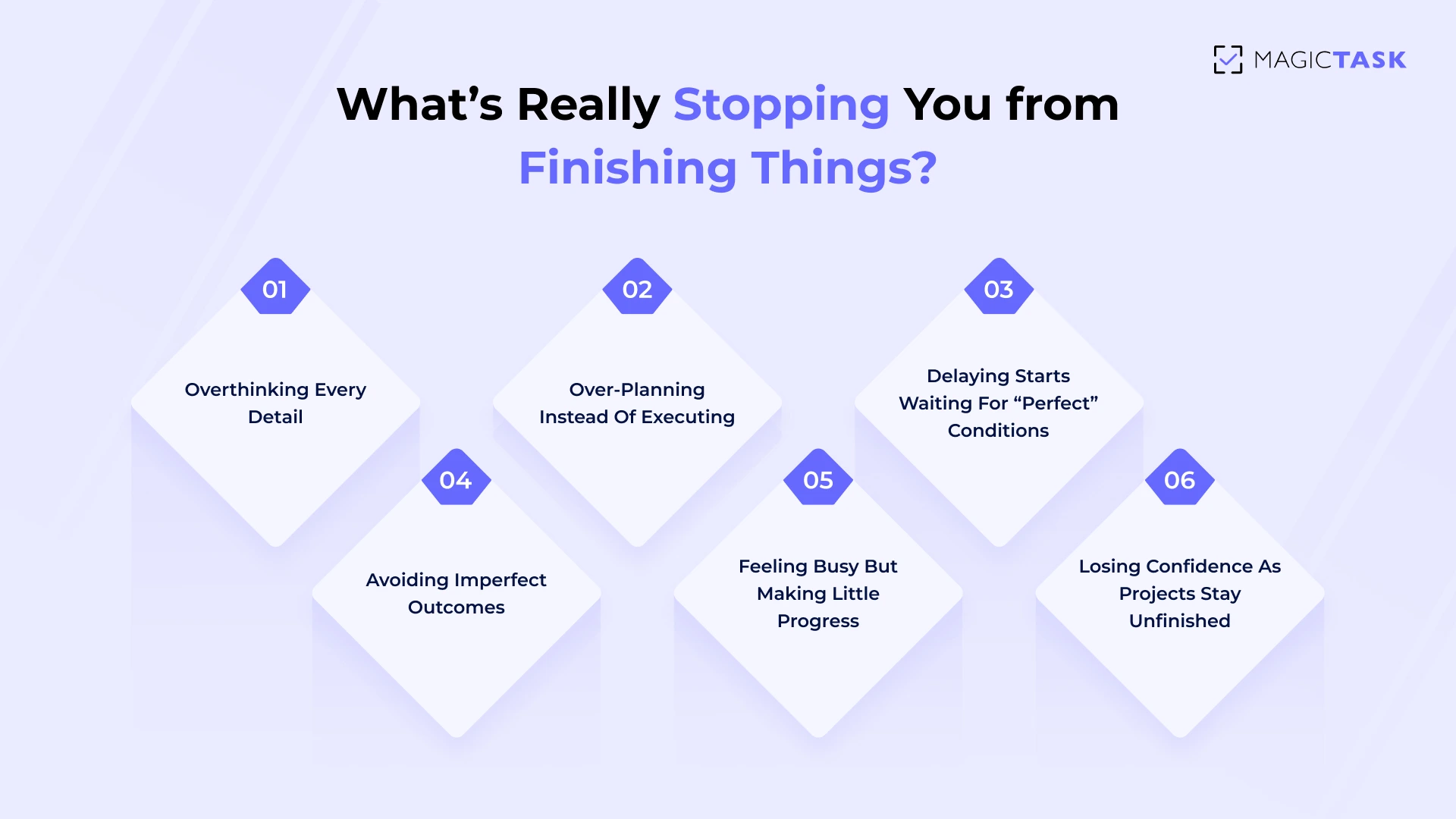
Here’s how perfectionism quietly slows you down:
- Overthinking every detail until decisions feel impossible to make
- Over-planning instead of executing, leaving little room for real progress
- Delaying starts because the “perfect” conditions never seem to arrive
- Avoiding imperfect outcomes, even when they would move you forward faster
As a result, you feel busy, but the needle barely moves. Your to-do list grows, yet meaningful progress stalls. You may even catch yourself starting multiple projects without finishing any because none of them ever feels “good enough.”
Over time, this constant cycle creates frustration, drains your energy, and erodes your confidence.
Breaking free from this trap begins with recognising the pattern. It’s your approach that needs rewiring.
How Do You Break the Perfection Loop and Actually Get Stuff Done?
When you constantly delay finishing because you’re chasing flawless results, progress suffers.
The key is to create systems that help you define success, manage your time, and move forward without second-guessing every decision.
1. Define What “Done” Looks Like Before You Start
Before you start working on any task, take a moment to define what “done” actually looks like.
Without clear boundaries, perfectionism creeps in, and you end up tweaking endlessly instead of finishing. A clear “definition of done” sets expectations upfront, helps you prioritise, and removes the guesswork from deciding when to stop.
For example, instead of saying, “I’ll work on the client report,” define it as: “The report is considered done when the executive summary, charts, and recommendations are drafted, proofread, and sent for review.”
This simple shift creates clarity, reduces decision fatigue, and makes it easier to move forward confidently without spiralling into endless revisions.
2. Embrace Version 1 Thinking
Perfectionism thrives when you believe your first attempt needs to be flawless. Shifting to a “Version 1” mindset removes that pressure and focuses on getting something out instead of getting it perfect.
The goal isn’t to deliver the final masterpiece immediately — it’s to create a solid foundation you can refine later.
Here’s how to practice Version 1 thinking:
- Start fast, iterate later – Get the first draft, prototype, or idea out without overanalyzing.
- Shift focus from perfect to progress – Progress builds momentum, and momentum drives motivation.
- Set limits – Give yourself boundaries on time and effort, so you don’t spiral into endless edits.
When you allow yourself to create imperfectly at first, you unlock creativity and speed. The final polish can come later, once there’s something tangible to improve.
3. Time-Box Your Work
Perfectionism often shows up as endless tweaking. One way to break free from this cycle is to time-box your tasks. Instead of working until it “feels right,” you set a strict time limit for completing a task and commit to stopping when the timer ends.
This forces you to focus on progress, not endless polishing, and builds trust in your ability to finish.
Here’s how different time-boxing approaches work in practice:
| Approach | How It Works | Best For | Example |
|---|---|---|---|
| Pomodoro Method | Work in 25-minute sprints, followed by a 5-minute break. After four cycles, take a longer 15–30-minute break. | Deep work without burnout | Writing a blog section in 25 mins |
| Fixed Deadline | Set a clear finish time and stick to it, regardless of outcome. | Urgent tasks that can’t drag on | Finish pitch slides in 2 hours |
| Task-Based Limits | Assign time based on task size rather than difficulty. | Managing multiple priorities | 30 mins to review emails, 45 mins for meeting prep |
When you box your time, you replace “perfect” with “finished,” which builds momentum and creates natural stopping points.
4. Let Feedback Replace Internal Pressure
Perfectionism thrives when you keep your work hidden until it feels “ready.” The problem is, that moment rarely comes. Instead of endlessly refining in isolation, shift the focus from self-imposed pressure to external input.
Sharing your work earlier invites collaboration, gives you fresh perspectives, and speeds up progress.
Here’s how to make feedback your ally:
- Share drafts early: Even rough versions provide a starting point for discussion.
- Seek objective perspectives: External input often highlights what actually matters versus what you’re overthinking.
- Use feedback loops: Set up regular check-ins or reviews to avoid sitting on work for too long.
The goal is to iterate faster. By getting feedback sooner, you spend less time trapped in the perfection loop and more time improving what truly matters.
How MagicTask Makes It Easier to Start, Focus, and Finish
Breaking free from perfectionism is about having the right system to guide your focus. That’s where MagicTask comes in.
Its gamified design, structured task sizing, and visual progress tracking make it easier to start, stay engaged, and actually finish what you set out to do.
Instead of wrestling with endless to-do lists, you get a tool that encourages action, rewards consistency, and keeps distractions to a minimum.
1. Task Breakdown and Sizing Helps You Start
Perfectionism often kicks in when tasks feel too big, too vague, or too intimidating to begin.
You stare at a long, undefined to-do list and start overthinking: Where do I start? What if I mess this up? That mental friction creates delays, and delays feed procrastination.
MagicTask solves this problem by helping you break large goals into smaller, structured tasks and then assign each one a task size — S, M, L, or XL.
These sizes aren’t just labels; they represent the estimated effort and focus required. Once you define the size, the task stops feeling overwhelming and starts feeling actionable.
Why Task Sizing Works
- Removes ambiguity: A vague “Finish report” task becomes a series of smaller, defined actions.
- Creates a natural starting point: You can pick smaller tasks first to build momentum.
- Improves planning accuracy: You know exactly how much time to allocate based on size.
- Boosts motivation: Smaller wins add up fast, giving you a sense of consistent progress.
| Task Size | Effort Level | Example Task | Impact on Progress |
|---|---|---|---|
| S (Small) | 10–15 mins | Reply to client email | Quick win, builds early momentum |
| M (Medium) | 30–45 mins | Draft project outline | Manageable focus, steady progress |
| L (Large) | 1–2 hours | Create presentation slides | Requires deeper concentration |
| XL (Extra-Large) | 3+ hours | Finalise quarterly strategy | Break into subtasks for efficiency |
With this structure, you always know where to begin, how much time to budget, and what success looks like. Instead of chasing “perfect,” you focus on making measurable progress, one task at a time.
2. Subtasks Are Organized, Not Overwhelming
One of the biggest triggers for perfectionism is seeing a massive project on your to-do list without knowing where to begin. The weight of that single “big task” can make it feel impossible to start.
MagicTask solves this by letting you break projects into neatly organized subtasks, each one actionable, clear, and manageable.
Instead of dumping everything into one endless checklist, subtasks in MagicTask are grouped logically within their parent task. This structure gives you a visual roadmap, helping you understand what needs to be done first and what can wait.
There’s no chaos, no scattered notes, and no constant context-switching. You simply focus on the next subtask in line, finish it, and move forward with confidence.
This approach keeps you from overthinking, reduces mental clutter, and turns big, intimidating projects into clear, achievable steps that keep momentum flowing.
3. Daily Planning Flow Keeps You Moving
MagicTask’s daily planning ritual helps you turn intention into action. Start your day by mind-dumping tasks, then drag them into order based on importance and effort.
With your plan set visually, you avoid overthinking and slip naturally into execution mode. The system reduces mental clutter while keeping priorities in focus.
4. Progress Is Gamified to Rewire Your Mindset
Perfectionism thrives when progress feels invisible. MagicTask flips that dynamic by rewarding consistent action rather than flawless execution.
Each task you complete earns points, unlocks visual animations, and pushes your themes to the next level, creating a feedback loop that makes moving forward feel natural and rewarding.
Gamification works because it connects small wins to tangible rewards, helping you retrain your brain to value progress over perfection. Studies show that organisations using gamified systems experience up to a 90% increase in productivity. Instead of fixating on “perfect,” your focus shifts to completing tasks, building momentum, and celebrating measurable achievements.
Here’s how MagicTask helps you break free from the perfection trap:
- Points for every task → Builds a sense of accomplishment immediately.
- Theme-level progression → Visual milestones keep motivation high.
- Instant feedback cues → Satisfying animations and sounds reinforce action.
- Consistent reward cycles → Keeps you coming back, even on low-energy days.
MagicTask turns productivity into an addictive loop of achievable wins. Over time, you stop obsessing over flawless results and start training your mind to crave progress instead.
How Does Gamification Shift Your Mindset from Perfect to Progress?
Perfectionism often tricks you into believing you need to “feel ready” before taking action. That mindset leads to delays, overthinking, and endless tweaking. MagicTask turns this on its head by rewarding progress, not perfection.
Instead of waiting for the “right moment,” you’re motivated to start, act, and complete tasks because each step forward gives you instant feedback and a sense of accomplishment.
Here’s how MagicTask shifts your focus from flawless results to consistent progress:
- Rewards action, not hesitation - Points are earned for completing tasks, not perfecting them.
- Theme-level growth - Progression systems make consistent action feel meaningful and visible.
- Momentum-driven design - Small wins stack up, keeping you engaged and motivated.
- Positive reinforcement - Animations, sounds, and points create a feedback loop that encourages starting, not stalling.
This shift rewires your brain to crave progress and momentum over flawless outcomes, helping you stay productive without getting stuck in the perfection trap.
What Does a Productive (But Imperfect) Day Actually Look Like?
A productive day is about steady, intentional progress. When you let go of the need to get everything “just right,” you create space to focus on what truly matters. Instead of wasting time perfecting small details, you build momentum through action and structured planning.
Here’s what a balanced, progress-driven day looks like:
- Start with a daily mind dump → Capture everything on your mind without filtering or judgment.
- Time-block your execution → Allocate focused work periods but leave room for flexibility and last-minute changes.
- Mix deep work with quick wins → Balance high-priority projects with smaller, lighter tasks to maintain energy.
- Celebrate progress over polish → Done beats perfect every time. Progress compounds faster than waiting for “ideal” results.
By shifting the focus from perfection to completion, you stay consistent, build confidence, and keep your productivity flowing without burning out.
How Does MagicTask Keep You Consistent Without Overthinking?
Staying consistent isn’t about doing more — it’s about removing friction so you can focus on progress. MagicTask makes this effortless by turning planning into a lightweight ritual instead of a stressful process.
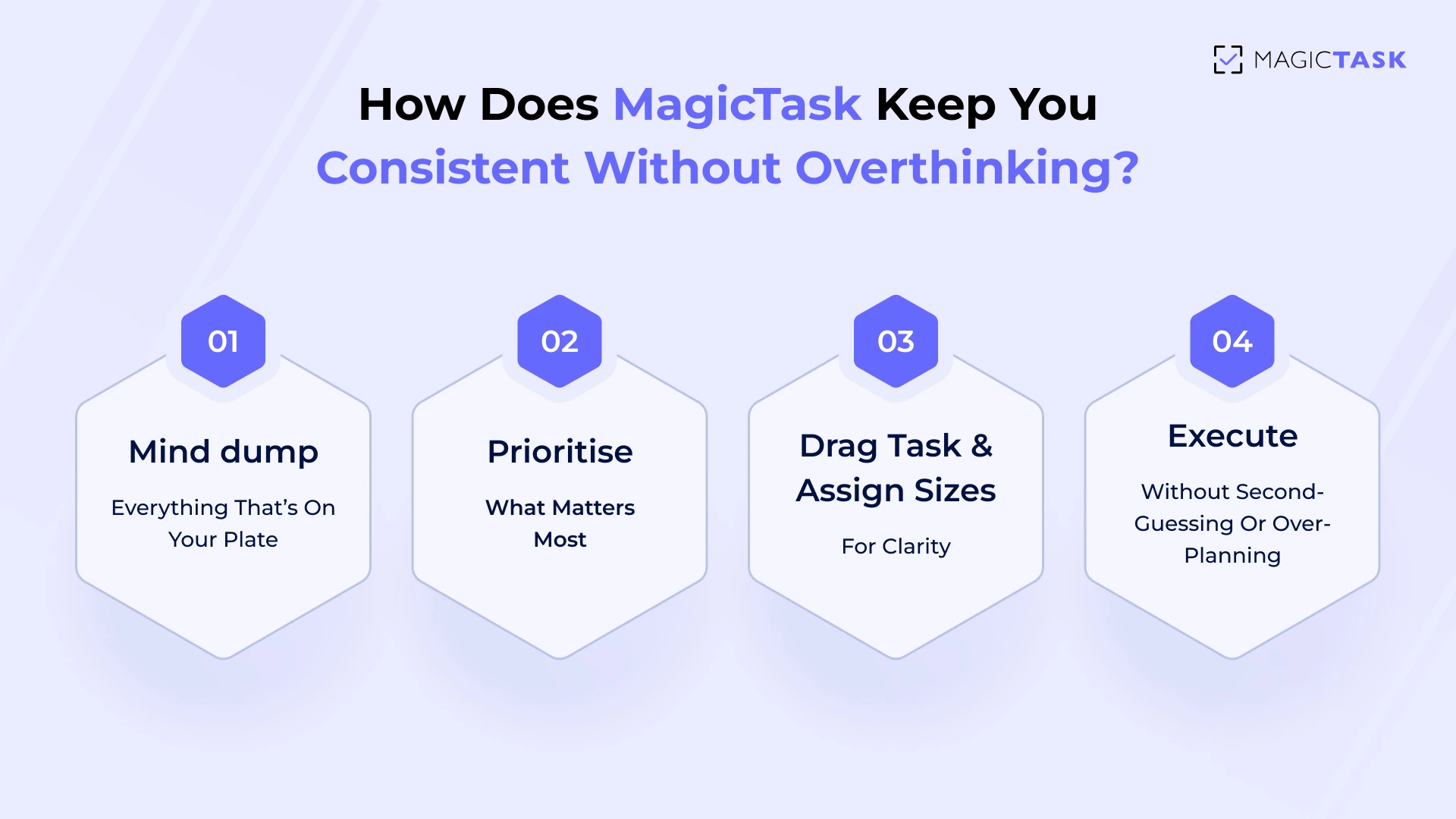
You start your day with a daily planning flow inside MagicTask:
- Mind dump everything that’s on your plate
- Prioritise what matters most
- Drag tasks into order for a clear execution path
- Execute without second-guessing or over-planning
The clean, distraction-free interface keeps you focused; no bloated dashboards, noisy team feeds, or cluttered views to slow you down. Progress also feels rewarding, thanks to visual gamification.
Points, levels, and theme upgrades give you instant feedback, which keeps motivation high even on low-energy days.
This combination of structure and simplicity builds a natural rhythm, helping you stay consistent without falling into the perfectionist trap.
Conclusion
Perfectionism feels like productivity, but it quietly drains your time, energy, and creativity. While you’re stuck polishing details and overthinking outcomes, real progress slips away. It’s not about lowering your standards; it’s about shifting your focus from flawless execution to consistent action.
By using systems that reward momentum, you can maintain high-quality results without getting trapped in endless cycles of tweaking and hesitation.
MagicTask makes this shift seamless. Its lightweight, gamified approach turns productivity into something intuitive and even enjoyable. You’ll stay focused, finish tasks faster, and finally stop perfectionism from holding you back.
Progress beats perfect, and with MagicTask, building that habit becomes effortless.
